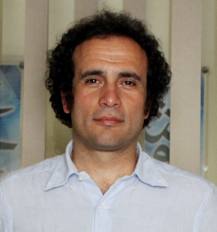 Amr Hamzawy
Amr Hamzawy
Al- Watan newspaper
Some factions within the Egyptian community denounced the evolution of the 25 January revolution chiding all negative consequences ensued from the nation-wide protests.
Amr Hamzawy, in his column ‘The revolution, Egypt and the coming president’ answered the very fundamental question of ‘what did 25 January revolution achieve?’ In a groundbreaking occurrence, Egyptians freely chose their first civilian president.
It was not a choice for ordinary Egyptians throughout a span of more than 30 years to decide on the identity of their homeland and its ruler.
Hamzawy noted that the 25 January revolution made a finale to a long road of a long-lived autocratic government.
The typical Egyptian is now part of the political process, and in most of the cases a basic component to the path of democracy.
A kernel achievement of the 2011 uprising is limiting presidential terms to no more than eight years, Hamzawy wrote while explaining that Egyptians themselves are the only factor that allows president to either extend their rule to another term or swapping their power for that of anothers’.
As Egypt opens a new page in its political history book, the new president will be held accountable if proven culpable.
Subjects relating to accountability and responsibility shall be taken seriously in a country opting for its first ever chosen president.
The writer continued to display thriving outcomes of the uprising and stated that Egyptians have been for the first time courageous enough to face dictatorship and fight for freedoms.
And not only that they celebrate their freedoms, Egyptians are even able to diversify styles of demonstration, ways of oppositions and sit-ins.
For the next years to come, Egyptians will no longer accept any limitations to their choices or any president who wishes seal their lips.
 Hamdi Kandil
Hamdi Kandil
Al-Masry Al-Youm
Hours before the announcement of the presidential elections run-off results, Hamdi Kandil examined the rumors circulated in tabloid newspapers about the inevitable civil war that would have wiped out Egypt, at a time when the Israeli army was carrying out suspicious deployments on Egypt’s eastern borders, and when heavy weaponry was being smuggled through its western borders.
Kandil criticised reports in the media about the ‘Upcoming Massacre of the Century’ in Egypt, and viewed with cynicism the recent political performance of the Supreme Council of Armed Forces (SCAF), whom he blamed for instigating these rumors.
Amid this projected turbulence, Kandil advocated his stance, which has come in pursuit of national accord and stability, to approach the Muslim Brotherhood directly and publicly, despite fears that they might well resort to violence in the event Ahmed Shafiq, Mubarak’s last prime minister, emerged as the new president.
Kandil envisioned his efforts within the framework of the broader strife of mainstream national figures such as Mohamed ElBaradei, Hamdin Sabahi, and Amr Moussa, to promote a status of national concurrence, and to put the revolution back on track.
Despite his skepticism of the brotherhood, Kandil accepted the invitation of Mohamed Morsi’s presidential campaign on the Thursday before the announcement of results, considering this acceptance as the price to safeguard the country from a possible eruption.
Being the first to address Morsi, Kandil presented all the fears people have against the Brotherhood, namely their organisation of million-man marches in Tahrir Square to counteract the SCAF’s decisions, while holding secret meetings with the generals behind the scenes.
He made it clear before Morsi that only the commitment to the demands of the people, will guarantee the support of all revolutionary factions.
Kandil then praises the statements made by Morsi on the following day, where he pledged before the people to establish a democratic and civil state, protect freedoms, safeguard citizenship rights, appoint deputies from among youth, women, and Copts, form a national unity government whose cabinets are not assigned to the Muslim Brotherhood, and create a Constitution Drafting Committee that reflects the broad spectrum of political opinions.
Questioning what will be written in history textbooks in the near future, Fatma Naout speculated that eperts reading ‘The great revolution erupted on 25 January 2011, resulting in a fairly elected revolutionary Parliament, which worked on resolving people’s problem, and was followed by free presidential elections, in which the people agreed on president X, who then led the country towards the future,’ could well be taught to children as being the absolute truth.
In her opinion, Naout sees the parliament was not fairly elected, due to the deliberate inclusion of religious polarisation and sentiments, reaching the point of accusing those who did not vote for the Islamists as being ‘infidels.’
Nevertheless, Naout considered the parliament to be anything but revolutionary. She criticised the direction toward which discussions were held under the parliament’s dome, from calls to allow 12 year-old girls to get married, to working on banning education in English language under the pretext that it is ‘haram’.
Further, she does not even see the point behind considering the president as enjoying popular agreement.
Naout then depicted what she described as the contrast between the Muslim Brotherhood’s politics, and what justice entails, being two un-associable opposites.
While justice would have given the rule to the revolutionaries, politics is based upon religious deterrence and the loud voice handed to the Parliament, the syndicates, and the Constitution Drafting Committee to the brotherhood.
Moreover, when justice and correctness meant a constitution prior to parliamentary elections, the Muslim Brotherhood rushed to collect the fruits and seats of an early parliamentary victory.
They even put it bluntly before the people, ‘Either Morsi or collateral damage,’ and threatened to peril the country had the legally disbanded parliament not been restored. Naout bitterly stated that while justice considers Egypt for all Egyptians, the brotherhood’s actions could be translated as, ‘Egypt is our proclaimed trophy, after 80 years of hard work.’
While justice calls for ‘Shura,’ i.e. consensus, the brotherhood’s motto reads ‘prepare for them whatever force you could,’ above their logo consisting of two crossed swords, ready to slay whomever dares to confront them.
 Salama Ahmed Salama
Salama Ahmed Salama
Al-Shorouk newspaper
As the presidential elections draw to a close, Salama Ahmed Salama envisioned diverse scenarios that could surface in Egypt’s future after naming the new president in his column ‘when does the nightmare end?’ The writer noted that Egyptians must savor a confidence spur as they arose Monday to discern that they have actually granted legitimacy to in their first president.
Salama described the new phase of Egypt as one governed only by law.
All Egyptians have to comply with statutes and rules, even the new president. He needed to be reminded that his victory was ensured from the nation’s unification rather than partisan coalitions, he wrote.
Salama then scrutinised the brawny status of the division that struck Egypt before the formal announcement of presidential elections.
The latest Washington statements urging the Supreme Council of the Armed Forces (SCAF) to transfer powers also added to a general mood of exasperation.
Egyptians have perceived Western reports as a mere interference in their country’s internal affairs, he wrote.
The writer recalled several of the foreign statements that stirred squabbles between SCAF and Islamist powers, while accusing the military institution of hindering the democratic process.
Salama estimated that recent western intrusion signified how the US shores up to accept the Muslim Brotherhood (MB) as a coming dominating power.
The writer refered to many Islamist figureheads who lined up in Washington in light of disbanding the parliament.
Questions popped up on which direction is Egypt heading. Salama, who apparently wrote the column before the naming of Morsi as a president, noted that the Islamist president would have to deal with a set of inherited dilemmas including the constitutional assembly drafting the new constitution, a dissolved parliament and SCAF’s addendum to the constitutional declaration. Morsi is now compelled to solve many difficult equations, the writer noted.
Salama anticipated million man marches in Tahrir on condition of Morsi’s advancement in elections.
However, even if protests did not end successful in eliminating the group of maladies in Egypt, the new president would remain facing the unsolved questions.


